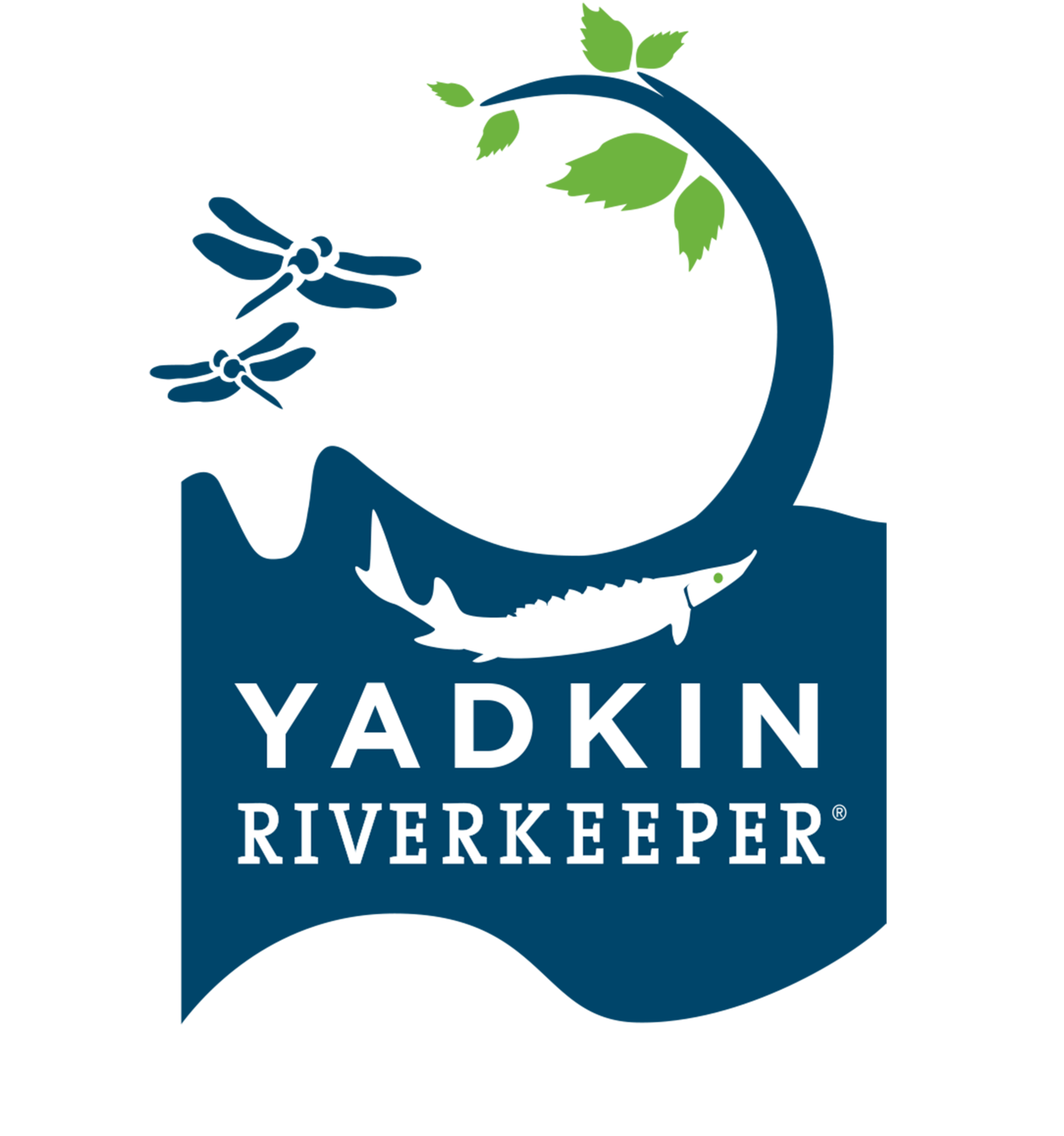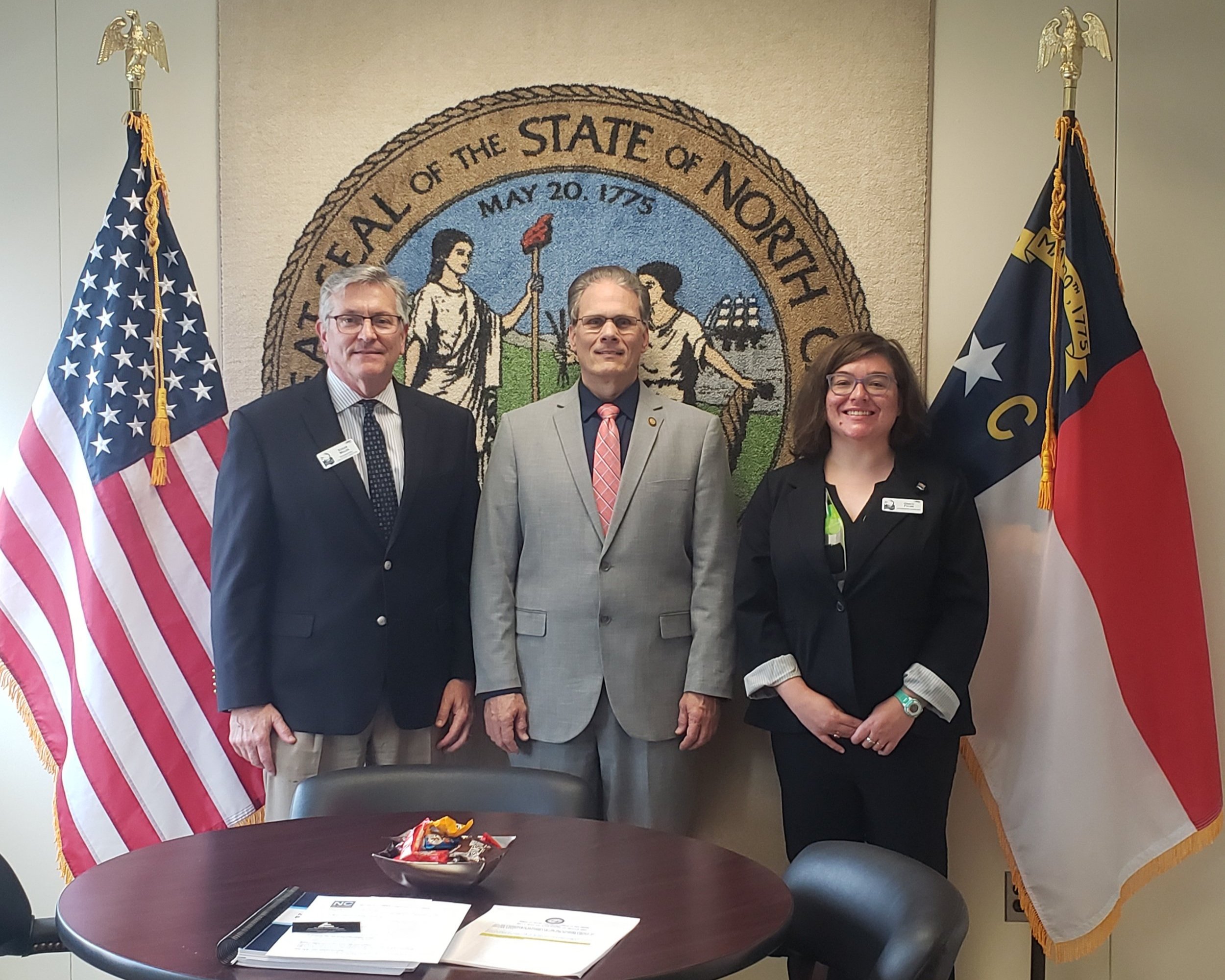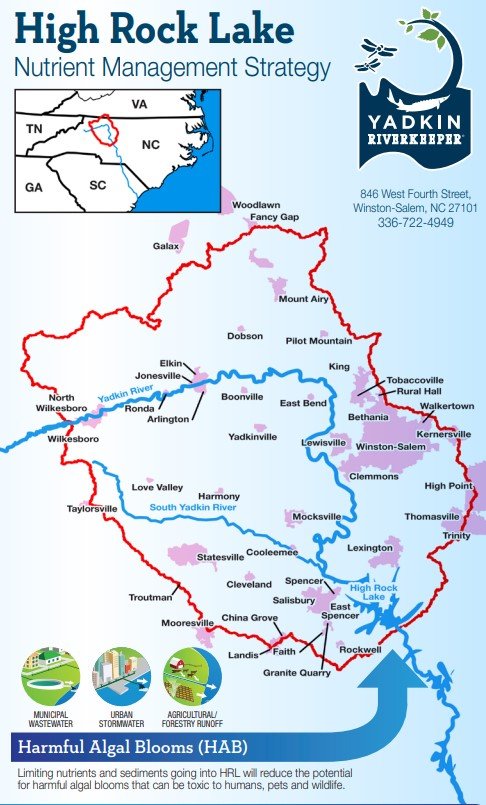Edgar Miller, Riverkeeper and Executive Director
Yadkin Riverkeeper continues to be the voice for the River on numerous issues. See below for an update on our top advocacy priorities:
Riverkeeper Lobby Day – Yadkin Riverkeeper Edgar Miller and Riverkeeper assistant, Grace Fuchs, traveled to Raleigh for the statewide Waterkeepers Carolina meeting and Lobby Day at the NC General Assembly on March 28-29. Riverkeepers from across the state met with their state House and Senate members to share concerns about stormwater management legislation and discuss the need for more oversight of the poultry industry. YRK also advocated for funding the Yadkin River State Trail blueway and updated legislators on the High Rock Lake Nutrient Management Strategy (see below for updates).
Yadkin River State Trail (YRST) Funding in House Budget – In the good news category, the NC House budget includes $50,000 for YRK to continue its work to make improvements to the YRST. The funding is part of $8 million proposed in the budget for the “Complete the Trails” funds, which will support trail construction and land acquisition for designated state trails, including the YRST. The budget also includes $100,000 specifically for YRST projects and $25 million for the “Great Trails State Fund,” which would fund trail projects across the state on a competitive basis. The budget now moves to the NC Senate for consideration.
High Rock Lake (HRL) Nutrient Management Strategy Moves Forward YRK staff continues to participate in the NC Division of Water Resource’s (NCDWR) stakeholder process for the development of a nutrient management strategy for HRL. Reducing nutrient pollution (phosphorus, nitrogen) from wastewater treatment plants, and sediments and nutrients from urban stormwater and agricultural runoff, will improve water quality in both the River and HRL. The goal of the strategy is to bring HRL into compliance with the newly adopted chlorophyll-a standard and to reduce the potential for harmful algal blooms or “HABs.” HABS can be toxic to humans, pets and wildlife. YRK is pushing for increased river/stream buffer and floodplain protections and compliance and enforcement of existing poultry litter regulations. YRK also supports targeted reductions in nutrients from municipal wastewater treatment plants and additional enhancements to stormwater control measures in the basin. The NCDWR will hold a public stakeholders meeting at the Salisbury Civic Center on May 31, from 3 – 5 PM. YRK members are encourage to attend.
Alcoa Badin Business Park Update - YRK participated in the Reimagining America Project’s two-part webinar series on hazardous waste cleanup and environmental justice issues related to the cleanup of hazardous waste disposal sites at Alcoa’s shuttered smelter in Badin, NC. Several of these disposal sites are leaching contaminants into the groundwater, Badin Lake and Little Mountain Creek. Riverkeeper Edgar Miller and YRK Environmental Justice Advocate Bailey Hill participated in a two-part webinar series presented by the Reimagining America Project (RAP) on the history of the Alcoa Badin Works and it’s impacts on water quality and the predominantly African-American West Badin community. Edgar reviewed the ongoing issues with Alcoa efforts to renew its stormwater discharge permit and obtain a hazardous waste cleanup plan permit and Bailey highlighted the state’s flawed model for identifying environmental justice concerns of the West Badin community. RAP is a faith-based, social justice initiative in Charlotte, founded by former Charlotte mayor, Jennifer Roberts, and prominent black clergy members in the greater-Charlotte region. You can watch the video of the Part I of the webinar featuring me here and Part 2 featuring Bailey here.
Smith Reynolds Airport Deannexation Bill Raises Stakes for Impacted Communities – YRK continues to strengthen relationships with residents and community leaders from neighborhoods in Northeastern Winston Salem who have been impacted by soil erosion and flooding due to issues related to Brushy Fork Creek and land clearing activities at the Smith Reynolds Airport. YRK has connected with local resident leaders associated with Neighbors for Better Neighborhoods to educate local elected officials about the ongoing concerns. The introduction of a bill in the NC General Assembly to de-annex the Airport from the City also has residents concerned that the erosion problems will not be addressed. YRK will continue to document stormwater concerns caused by the airport and will work with the community to identify environmental impacts and support community-based solutions to address these impacts.
PFAS in the News. In the wake of EPA’s proposal to dramatically lower PFAS/PFOS levels in drinking water, there has been considerable media and local government attention on the need to address widespread PFAS/PFOS contamination in our water and the cost of doing so. WPDE-TV in Conway, SC, interviewed Yadkin Riverkeeper and the Black and Waccamaw Riverkeepers, about our concerns regarding PFAS/PFOS in the Yadkin Pee Dee River. Winston-Salem Forsyth Utilities recently reported they have not detected any PFAS/PFOS in drinking water, although published data collected by the NCDWR shows otherwise. YRK and NC State University sampling has also found a variety of PFAS/PFOS in the River.






